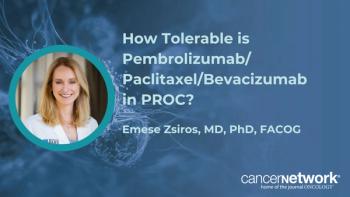
Tepotinib in MET exon 14 Skipping NSCLC Induces Durable Responses
The MET inhibitor tepotinib demonstrated durable clinical activity in non‒small cell lung cancer tumors harboring MET exon 14 skipping mutations.
Results from subgroup analyses of patients with MET exon 14 skipping non‒small cell lung cancer (NSCLC) from the single-arm, phase 2 study VISION study (NCT02864992) demonstrated durable clinical activity of tepotinib in both treatment-naïve and previously treated disease.1
In these data that were presented during the 2020 World Conference on Lung Cancer (WCLC) Singapore, 152 patients had 9 or more months of follow-up and were assessed for efficacy in Cohort A and 255 were evaluated for safety in Cohorts A and C as of data cut-off of July 1, 2020. Paul K. Paik, MD, clinical director of Thoracic Oncology Service at Memorial Sloan Kettering Cancer Center, presented the findings virtually at the meeting.
Patients with advanced, EGFR/ALK wild-type, METex14 skipping NSCLC received oral tepotinib 500 mg once daily. Efficacy outcomes were consistent in patients who received prior platinum-based chemotherapy and/or immune-oncology (IO), study authors found.
In treatment-naïve patients from Cohort A (n = 69), the overall objective response rate (ORR) was 44.9% (95% CI, 32.9 to 57.4), with a median duration of response (DOR) of 10.8 months (95% CI, 6.9-not evaluable). Progression-free survival (PFS) was 8.5 months (95% CI, 6.8-11.3).
In previously-treated patients from Cohort A (n = 83), overall ORR was 44.6% (95% CI, 33.7- 55.9), median DOR was 11.1 months (95% CI, 9.5-18.5), and median PFS was 10.9 months (95 CI, 8.2-12.7).
Tepotinib was generally well tolerated across therapy lines, with mostly mild-moderate adverse events (AEs) and few discontinuations. The most common treatment-related AE, peripheral edema, was mostly low grade (Grade ≥3: 7%) and rarely led to discontinuation (4%). Other common AEs include nausea, diarrhea, blood creatine increase, and hypoalbuminemia. The safety profile was consistent in patients who received prior IO, study authors found.
In the efficacy population, patients had a median age of 73.4 years (range 41-94), 76 were male (52.1%), 76 had a smoking history (52.1%), and 81 had received prior treatment for advanced/metastatic disease (55.5%). Seventy-two patients had received prior platinum-based chemotherapy for metastatic disease, either alone (n=63) or in combination with immunotherapy (n = 9).
The FDA granted priority review for tepotinib under the FDA Real-time Oncology Review pilot program in August 2020 for the treatment of adult patients with NSCLC whose tumors have a mutation that leads to mesenchymal-epithelial transition exon 14 (METex14) skipping.2
The application was based on early analysis of the VISION study, which was published in The New England Journal of Medicine and presented during the American Society of Clinical Oncology Virtual Scientific Program.3 In this review, at data cut off of January 1, 2020, a total of 152 patients had received tepotinib, and 99 patients had been followed for at least 9 months. The response rate by independent review was 46% (95% CI, 36-57), with a median DOR of 11.1 months (95% CI, 7.2-not estimated). The response rate was 48% (95% CI, 36-61) among 66 patients in the liquid-biopsy group and 50% (95% CI, 37-63) among 60 patients in the tissue-biopsy group.
In this earlier analysis, adverse events of grade 3 or higher that were considered by investigators to be related to tepotinib therapy were reported in 28% of the patients, including peripheral edema in 7%. Adverse events led to permanent discontinuation of tepotinib in 11% of the patients.
Tepotinib was granted breakthrough therapy designation by the FDA in September 2019 for the treatment of patients with metastatic NSCLC harboring METex14 skipping alterations who progressed following platinum-based cancer therapy.4
In March 2020, the Japanese Ministry of Health, Labour and Welfare approved tepotinib for the treatment of patients with unresectable, advanced or recurrent NSCLC with METex14 skipping alterations. The agent is not available outside of Japan.
References:
1. Paik PK, Sakai H, Felip E, et al. Tepotinib in patients with MET exon 14 (METex14) skipping advanced NSCLC: updated efficacy from VISION Cohort A. Presented at: International Association for the Study of Lung Cancer 2020 World Conference on Lung Cancer; January 28-31, 2021; Virtual. Abstract MA11.05
2. FDA accepts filing of new drug application for tepotinib for the treatment of patients with metastatic NSCLC with METex14 skipping alterations. News release. Merck KGaA. August 25, 2020. Accessed January 31, 2021. http://bit.ly/3cmp6pI
3. Paik PK, Felip E, Veillon R, et Tepotinib in non‒small cell lung cancer with MET exon 14 skipping mutations. N Engl J Med. September 3, 2020. doi:10.1056/NEJMoa2004407
4. Merck KGaA, Darmstadt Germany, announces FDA breakthrough therapy designation for investigational therapy tepotinib in patients with metastatic NSCLC with MET ex14 skipping alterations. News release. Merck KGaA. September 11, 2019. Accessed January 31, 2021. http://bit.ly/2YxxbQk
Newsletter
Stay up to date on recent advances in the multidisciplinary approach to cancer.










































